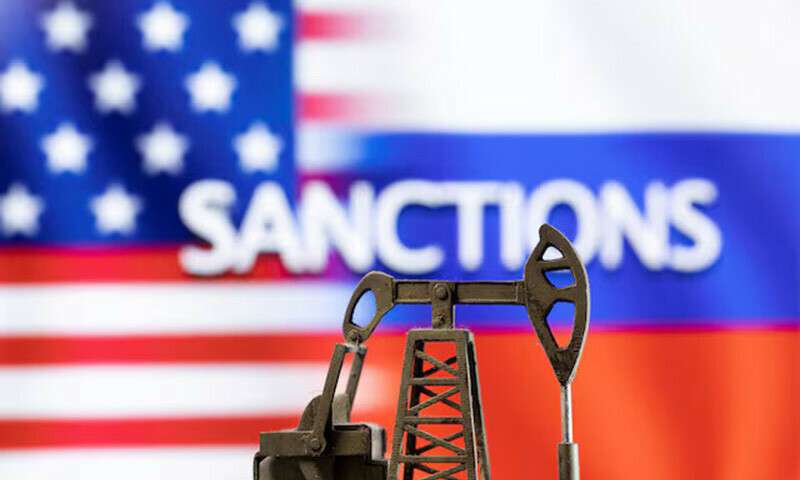In a stern reaction to the latest round of energy sanctions imposed by the United States, the Kremlin has voiced concern over the potential destabilizing effects these measures could have on global oil and energy markets. Kremlin spokesman Dmitry Peskov stated on Monday that Moscow would take all necessary steps to mitigate the impact of these sanctions on its economy. He warned that such moves could exacerbate instability within international energy markets, particularly those involving oil and gas.
The United States, under its ongoing policy to pressure Russia over its actions in Ukraine, imposed wider sanctions on Russian energy producers and entities tied to the oil industry. According to officials, the goal of these sanctions is to reduce Russia’s financial resources used to fund its war efforts. As part of this crackdown, Gazprom Neft and Surgutneftegaz, two of Russia’s largest energy companies, along with 183 oil tankers involved in transporting Russian oil, were targeted.
These latest sanctions, which follow several other punitive measures over the course of the war in Ukraine, have raised concerns among countries that heavily rely on Russian energy exports, particularly China and India. As major buyers of Russian oil, both nations have begun to explore alternative sources of crude oil following the sanctions.
Details of the New US Sanctions on Russia’s Energy Sector
US Sanctions Target Key Russian Energy Players
The new sanctions, imposed by the US Treasury Department on Friday, are seen as part of Washington’s strategy to further cripple Russia’s ability to finance its military actions in Ukraine. The sanctions directly target some of the most important players in Russia’s energy sector, including Gazprom Neft, a subsidiary of the state-owned Gazprom corporation, and Surgutneftegaz, one of Russia’s largest privately-held oil companies.
These companies are among the primary producers of Russian oil, and any efforts to limit their activities could have significant consequences on Russia’s overall energy output. The sanctions also extended to 183 vessels that have been involved in transporting Russian oil, primarily to China and India, which have been purchasing Russian crude despite the broader Western sanctions.
Impact on Russian Oil Revenues
US officials have stated that the sanctions are designed to cut off significant revenue streams for Russia, especially those used to fund its ongoing war efforts in Ukraine. The US Treasury’s latest measures are expected to cost Russia billions of dollars per month, assuming they are sufficiently enforced. While the sanctions are aimed at hurting Russia’s finances, there are growing concerns about the global impact these measures could have on energy prices and availability.
Global Oil Market Reactions
The announcement of the sanctions has already sparked reactions from global oil markets, with China and India, the two largest buyers of Russian oil, seeking alternative supplies. Both countries have consistently purchased Russian crude oil at discounted prices, with China and India emerging as crucial markets for Russia since Western nations and the European Union imposed their own energy bans earlier in the conflict.
In response to the sanctions, Chinese and Indian refineries have started exploring other sources of oil, a move that could push global oil prices even higher. Moreover, many of the 183 tankers targeted by the sanctions had been used to transport Russian oil to these two nations. As a result, the logistics of oil shipments from Russia could be significantly disrupted.
Russia’s Strategy to Mitigate Sanctions
Peskov: Russia Will Adapt to Sanctions
In response to the newly imposed sanctions, Kremlin spokesman Dmitry Peskov stated that Moscow would closely monitor the situation and make adjustments to its operations to minimize the impact of the sanctions. Peskov emphasized that it was impossible to completely cut off energy supply routes, and Russia would work to find alternative solutions for distributing its oil and gas resources.
“It is clear that the United States will continue to try to undermine the positions of our companies in non-competitive ways,” Peskov said. Despite these challenges, he remained optimistic that Russia could adapt to the changing landscape. “We expect that we will be able to counteract this,” he added.
Alternative Supply Routes and Energy Trade
Peskov pointed out that modern energy supply routes have proven resilient to sanctions in the past. “You block something in one place, and an alternative option appears somewhere else. Therefore, a search will be conducted for work options that will minimize the consequences of sanctions,” he said. This suggests that Russia is already looking for ways to sidestep the sanctions by rerouting its energy exports to other markets or seeking alternative shipping solutions.
Russia has also been building stronger energy ties with China and India as part of its broader strategy to pivot towards Asia in the wake of Western sanctions. The Power of Siberia pipeline, which carries Russian natural gas to China, is one example of this shift. Additionally, Russia’s oil export infrastructure has been adjusting to send more oil to Asia rather than to Europe, which had traditionally been one of its largest customers.
Energy Alternatives and Market Dynamics
Russia’s ability to maintain its position in global energy markets depends heavily on its ability to find alternative buyers for its oil and gas. While the European Union has largely cut its dependence on Russian energy, Russia is betting that demand from Asia will offset losses from the West. This strategy could be complicated by the fact that some of Russia’s largest buyers, including China and India, are beginning to diversify their energy sources.
However, energy experts argue that Russia still holds considerable leverage in the global energy markets due to its vast reserves and capacity for production. Even with sanctions in place, the sheer scale of Russia’s oil production and reserves makes it difficult for the global market to fully replace its output.
US Sanctions and Global Geopolitical Tensions
Wider Geopolitical Implications
The energy sanctions on Russia are part of a broader trend of economic warfare between the West and Russia in response to the latter’s actions in Ukraine. These sanctions are intended not just to economically isolate Russia but also to signal to other nations the costs of engaging with or supporting Russia.
The tension between Russia and Western nations has escalated in recent years, with energy playing a central role in the geopolitical standoff. The Nord Stream 2 pipeline, designed to carry Russian gas to Europe, was halted by Germany under pressure from the US and its European allies. Similarly, Russia has been seeking ways to circumvent financial sanctions by moving towards alternative currencies for oil and gas transactions, further complicating the global financial system.
As the geopolitical tensions continue, countries worldwide are carefully navigating their energy policies. The US and European Union have been pushing for renewable energy transitions as part of their longer-term strategy to reduce dependence on Russian fossil fuels. However, for many nations, the transition to green energy is still a work in progress, making fossil fuels an ongoing strategic asset.
Conclusion: Will Sanctions Disrupt Global Energy Markets?
The ongoing sanctions on Russia’s energy sector have the potential to disrupt not just Russia’s economy but also the broader global energy landscape. While Russia is prepared to minimize the damage through strategic adaptations and alternative trade routes, the reality is that global oil markets are intricately interconnected, and disruptions in one area can lead to ripple effects worldwide.
For countries heavily reliant on Russian energy, the immediate challenge will be securing alternative energy supplies without sending global energy prices into a further spiral. At the same time, energy-consuming nations will have to carefully balance the geopolitical costs of continuing to purchase Russian oil with the potential economic risks posed by rising energy costs.
The future of global energy markets depends on how these sanctions are enforced and whether Russia’s efforts to adapt can mitigate the impact of these punitive measures. The situation remains fluid, with many moving parts and competing interests at play in the global energy sector.
FAQs
1. What is the goal of the new US sanctions on Russian energy?
The new sanctions aim to reduce Russia’s revenues, particularly from its oil exports, which are used to fund the war in Ukraine. By targeting key Russian energy companies and oil tankers, the US hopes to undermine Russia’s economic stability.
2. Which companies are affected by the latest sanctions?
The US sanctions target Gazprom Neft and Surgutneftegaz, two major Russian energy companies, as well as 183 vessels involved in transporting Russian oil.
3. How has Russia responded to the US sanctions?
Russia has stated that it will do everything it can to minimize the sanctions’ impact by seeking alternative supply routes and adapting its energy strategy to maintain its position in global markets.
4. How will the sanctions affect global oil markets?
The sanctions could lead to increased oil prices globally as China and India, two major buyers of Russian oil, seek alternative suppliers. This shift could further disrupt global energy markets, which are already facing volatility.
5. What is Russia’s strategy to counteract the sanctions?
Russia plans to seek alternative energy markets, particularly in Asia, and will look for ways to reroute its energy exports to minimize the financial impact of Western sanctions.



